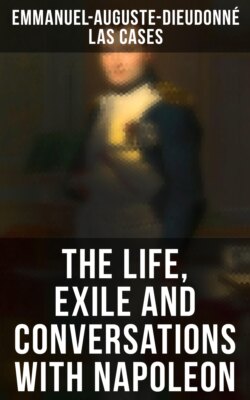Читать книгу The Life, Exile and Conversations with Napoleon - Emmanuel-Auguste-Dieudonné Las Cases - Страница 91
На сайте Литреса книга снята с продажи.
MY NEW LODGING DESCRIBED.—MORNING VISIT, &C.
ОглавлениеTable of Contents
21st.—I had at length taken possession of the new lodging built for me instead of my former oven. Upon a soil constantly damp had been placed a floor eighteen feet long by eleven wide; this was surrounded by a wall of a foot and half in thickness, composed of loam, and which might have been kicked down with the foot: at the height of seven feet it was covered with a roof of boards, defended by a coating of paper and tar. Such were the construction and the outline of my new palace, divided into two apartments, one of which contained two beds separated by a chest of drawers, and afforded room for only a single chair; the other, at once my saloon and my library, had a single window strongly fastened up on account of the violence of the winds and rain: on the right and left of it were two writing-tables, for me and my son; on the opposite side a couch and two chairs. This was the whole of the furniture and accommodations: add to this that the aspect of the two windows is towards a wind constantly blowing from the same quarter, and generally accompanied with rain, often very heavy, and which, previously to our taking possession, already forced its way through the cracks, or soaked through the walls and the roof. I had just passed my first night in these new quarters; I was indisposed, and my change of bed had prevented me from sleeping. I was informed about seven o’clock, that the Emperor was going out on horseback; I replied that, not feeling myself well, I should endeavour to take some rest; but only a few minutes had elapsed when a person hastily entered my apartment, opened my curtains with an air of authority, found fault with me for being so idle, and pronounced that my ailments must be shaken off; then, struck with the smell of the paint, the extreme smallness of the room, and the closeness of the two beds, he decided that we could no longer be suffered to sleep huddled together in that way; that it was far too unwholesome; and that I must return to the bed in the topographical cabinet, which I ought not to abandon through false delicacy; and that, if I occasioned any inconvenience there, I should be told of it. It will have been guessed that this person was the Emperor. I was, of course, soon out of bed, dressed, and well. The Emperor was, however, already far off: I had to seek him in the park. After I had overtaken him, our conversation turned on the long audience that he had given to Governor Wilks on the preceding day. He dwelt, with much good humour, on the great importance which my work appeared to have given me in the Governor’s eyes, and the extreme good-will towards me with which it seemed to have inspired him. “Of course,” continued he, “it is understood that these sentiments are to be mutual; the usual regard and fraternity of authors, as long as they do not criticize each other. And is he aware of your relationship to the venerable Las Casas?” I answered that I knew nothing of the matter; but General Gourgaud, who was on the other side of the Emperor, replied in the affirmative. “And how do you know it yourself?” said the Emperor to me; “Are you not romancing with us?” “The following, Sire, are my proofs. Our family had been two hundred years in France, when Barthelemi de Las Casas flourished in Spain; but the Spanish historians all describe him as a native of the same city from which we ourselves came, that is to say, Seville. They all mention him as of an ancient family, of French origin, and state his ancestors to have passed into Spain precisely at the time when our family went there.”—“What, then, you are not Spanish? He was French, as well as you!”—“Yes, Sire.”—“Let us hear all about it; come, Sir Castellan, Sir Knight-errant, Sir Paladin,—let us see you in your glory; unrol your old parchments; come, enjoy yourself.”—“Sire, one of my ancestors followed Henry Count of Burgundy, who, at the head of a few crusaders, achieved the conquest of Portugal, about the year 1100. He was his standard-bearer at the famous battle of Ourique, which founded the Portugese monarchy. Afterwards we returned to France with Queen Blanche, when she came to be married to the father of St. Louis. Sire, this is the whole.”
